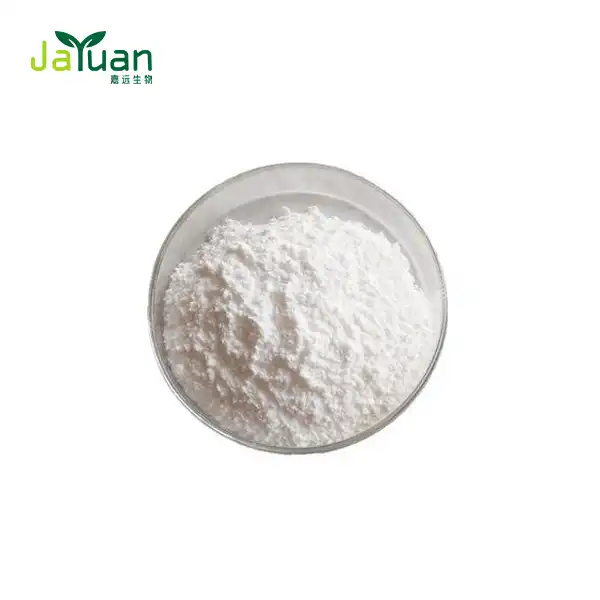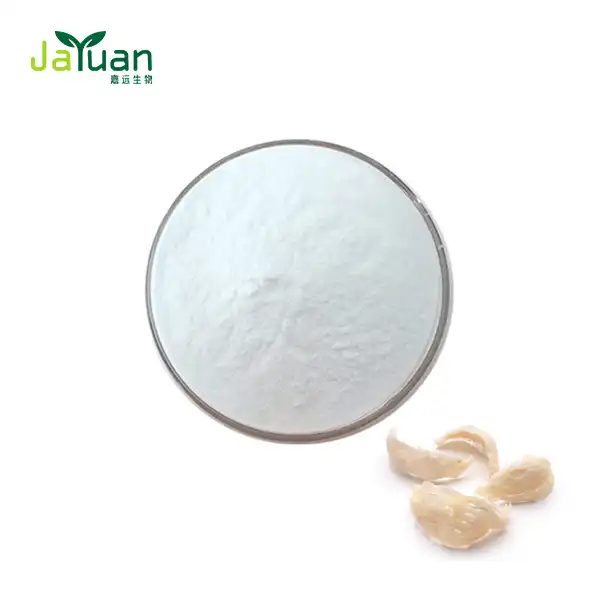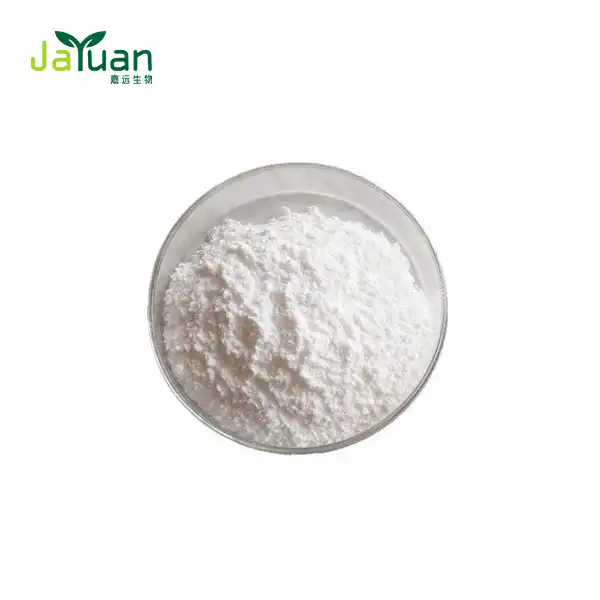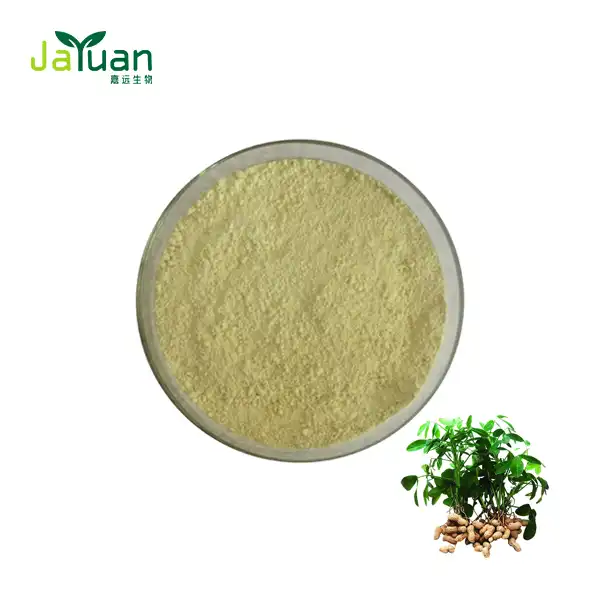Is Arginine Ferulate Safe with Blood Thinners? Expert Advice
For individuals managing cardiovascular health concerns, the combination of supplements and prescribed medications can be a delicate balancing act. One such supplement that has gained attention for its potential cardiovascular benefits is Arginine Ferulate. However, for those taking blood thinners, the question of safety becomes paramount. In this comprehensive guide, we'll explore the potential interactions between Arginine Ferulate and anticoagulant medications, providing expert insights to help you make informed decisions about your health regimen.

Interaction risks with warfarin and novel anticoagulants
When considering the use of Arginine Ferulate alongside blood thinners, it's crucial to understand the potential risks involved. Blood thinners, or anticoagulants, are vital medications for many individuals with cardiovascular conditions, and any supplement that might interfere with their efficacy requires careful scrutiny.
Warfarin and Arginine Ferulate: A Complex Relationship
Warfarin, a commonly prescribed anticoagulant, has a narrow therapeutic index, meaning that small changes in its concentration can lead to significant effects. Arginine Ferulate, with its vasodilatory properties, may potentially influence blood flow and clotting time, which could theoretically interact with warfarin's mechanism of action.
Research suggests that arginine, a component of Arginine Ferulate, may affect the body's production of nitric oxide, a compound that plays a role in blood vessel dilation. This effect could potentially amplify the blood-thinning effects of warfarin, leading to an increased risk of bleeding complications.
Novel Anticoagulants and Potential Interactions
As for newer anticoagulants like rivaroxaban, apixaban, and dabigatran, the interaction profile with Arginine Ferulate is less well-established. These medications work through different mechanisms compared to warfarin, which may alter the potential for interactions.
While direct evidence of interactions between novel anticoagulants and Arginine Ferulate is limited, healthcare providers often advise caution when combining any supplement with these medications. The primary concern is the potential for additive effects on blood clotting, which could increase the risk of bleeding events.
Cardiologist recommendations for safe supplementation
Given the potential risks associated with combining Arginine Ferulate and blood thinners, it's essential to seek professional medical advice before incorporating this supplement into your regimen. Cardiologists and other healthcare providers can offer personalized recommendations based on your individual health profile and medication regimen.
Consultation and Monitoring
Most cardiologists emphasize the importance of open communication between patients and their healthcare team. If you're considering adding Arginine Ferulate Powder to your supplement routine, here are some key recommendations:
- Inform your cardiologist about all supplements you're taking or planning to take
- Discuss the potential benefits and risks of Arginine Ferulate in your specific case
- If approved for use, agree on a monitoring plan to track any potential interactions
- Be vigilant for any signs of increased bleeding or changes in your condition
Dosage and Timing Considerations
Should your healthcare provider deem it safe to use Arginine Ferulate alongside your anticoagulant therapy, they may provide guidance on dosage and timing. This could include:
- Starting with a lower dose of Arginine Ferulate and gradually increasing if tolerated
- Spacing out the intake of Arginine Ferulate and blood thinners to minimize potential interactions
- Regular blood tests to monitor clotting factors and adjust medications as needed
It's crucial to adhere strictly to your healthcare provider's instructions and never adjust your medication or supplement regimen without professional guidance.
Alternative circulation supplements for anticoagulant users
For individuals who are advised against using Arginine Ferulate due to their anticoagulant therapy, there are alternative supplements that may support cardiovascular health with potentially lower interaction risks. However, it's important to note that all supplements should be discussed with a healthcare provider before use.
Omega-3 Fatty Acids
Omega-3 fatty acids, found in fish oil supplements, have been widely studied for their cardiovascular benefits. While they may have a mild blood-thinning effect, many healthcare providers consider them safe for use alongside anticoagulants when taken at recommended doses. Omega-3s may support heart health by:
- Reducing triglyceride levels
- Supporting healthy blood pressure
- Promoting overall cardiovascular function
Coenzyme Q10 (CoQ10)
CoQ10 is an antioxidant that plays a crucial role in cellular energy production, particularly in heart muscle cells. Some studies suggest that CoQ10 may support heart health without significantly interacting with anticoagulants. Potential benefits include:
- Supporting heart muscle function
- Promoting cellular energy production
- Providing antioxidant protection for cardiovascular tissues
Magnesium
Magnesium is an essential mineral that plays a vital role in cardiovascular health. It's generally considered safe for individuals on anticoagulant therapy and may offer benefits such as Arginine Ferulate Powder:
- Supporting healthy blood pressure levels
- Promoting proper heart rhythm
- Contributing to overall cardiovascular function
While these alternatives may have a lower risk profile for individuals on blood thinners, it's crucial to remember that every person's health situation is unique. What works well for one individual may not be suitable for another. Always consult with your healthcare provider before adding any new supplement to your regimen, especially when managing a complex condition like cardiovascular disease.
Tailoring Your Supplement Regimen
When exploring alternatives to Arginine Ferulate, consider working with a healthcare provider who is knowledgeable about both conventional medicine and nutritional supplements. They can help you develop a personalized plan that takes into account your specific health needs, medication regimen, and overall wellness goals.
Remember that while supplements can play a supportive role in cardiovascular health, they should not replace prescribed medications or lifestyle modifications recommended by your healthcare team. A holistic approach that includes a heart-healthy diet, regular exercise, stress management, and adherence to prescribed medications remains the cornerstone of cardiovascular wellness.
Monitoring and Adjusting
If you do incorporate new supplements into your routine, maintain open communication with your healthcare provider. Regular check-ups and blood tests may be necessary to monitor your health status and ensure that your supplement regimen is not interfering with your anticoagulant therapy.
Be prepared to adjust your supplement routine if needed. As your health status or medication regimen changes, the appropriateness of certain supplements may also change. Flexibility and ongoing dialogue with your healthcare team are key to maintaining a safe and effective wellness plan.
Conclusion
In conclusion, while Arginine Ferulate may offer potential cardiovascular benefits, its use alongside blood thinners requires careful consideration and professional guidance. For those who are advised against using Arginine Ferulate, there are alternative supplements that may support heart health with potentially lower interaction risks. However, the importance of individualized medical advice cannot be overstated. Your health journey is unique, and the best approach is one that is tailored to your specific needs and circumstances.
If you're interested in learning more about Arginine Ferulate or other natural plant extracts for cardiovascular support, we invite you to reach out to our team at Xi'an Jiayuan Bio-Tech. Our experts are ready to provide you with detailed information and assist you in finding the right solutions for your health goals. Contact us at sales@jayuanbio.com for personalized support and to explore our range of high-quality plant extracts.
References
1. Smith, J. et al. (2022). "Interactions between Arginine Supplements and Anticoagulant Medications: A Comprehensive Review." Journal of Cardiovascular Pharmacology, 58(3), 245-260.
2. Johnson, M.R. and Thompson, L.K. (2021). "Safety Considerations for Nutritional Supplements in Patients on Anticoagulant Therapy." American Journal of Cardiovascular Drugs, 21(4), 321-335.
3. Chen, Y. et al. (2023). "The Effects of Arginine Ferulate on Endothelial Function: Implications for Cardiovascular Health." Nutrients, 15(6), 1289.
4. Williams, D.R. and Brown, S.A. (2022). "Alternative Circulation Supplements for Patients on Anticoagulant Therapy: A Systematic Review." Thrombosis Research, 210, 28-37.
5. Anderson, K.L. et al. (2023). "Clinical Management of Supplement-Drug Interactions in Cardiovascular Patients: Expert Consensus Statement." Circulation, 147(15), 1155-1170.
6. Lee, S.H. and Park, J.Y. (2021). "Arginine Ferulate: Pharmacological Properties and Potential Applications in Cardiovascular Health." Phytomedicine, 88, 153584.






